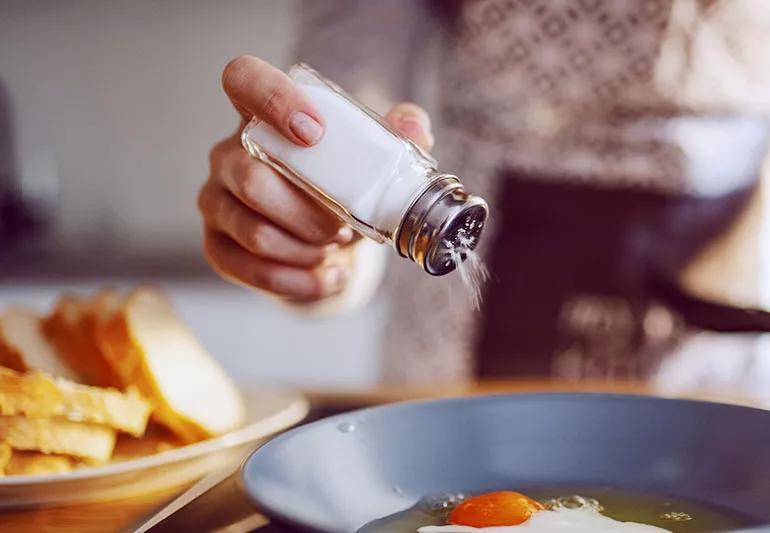Plus, 10 ways to combat your salt cravings

Image content: This image is available to view online.
View image online (https://assets.clevelandclinic.org/transform/b2918a47-818d-47fc-bf7f-f9e6dece1b37/addingSaltFood-1182718370-770x533-1_jpg)
cook adding salt to food
Potato chips. Pickles. If you have a salt lick, even better. Are you forever trying (and failing) to give up salty snacks? Take heart, says dietitian Beth Czerwony, RD. It’s possible to minimize those salt cravings. The key is understanding why you have them and planning ahead.
Advertisement
Cleveland Clinic is a non-profit academic medical center. Advertising on our site helps support our mission. We do not endorse non-Cleveland Clinic products or services. Policy
“The reasons behind salt cravings are multilayered. It’s not just one thing,” she says. “Look back on what was going on when you were craving salty foods. That can help you figure out what you can do to get control back.”
Much like Goldilocks’ experience with the Three Bears, our bodies need the “just right” amount of salt for proper functioning and fluid retention. And while too little salt causes problems, most Americans have too much in their diets.
“Eating too much sodium over time — even if it’s only a little more than recommended amounts — can affect our overall health. These bad effects happen with or without high blood pressure,” explains Czerwony. “It’s a cumulative effect — and not just on blood pressure. It’s systemic, affecting the whole body.”
Too much salt can damage the:
Advertisement
A salty hankering often comes from a combination of factors, says Czerwony. “You have to weigh out everything. If it’s a short-term craving, it could be based on how you were feeling and the situation at the time. But if you always need salt, then talk to your doctor. You may have an underlying condition that you need to take care of.”
Czerwony lists six possible reasons why you may have salt on the brain:
Stress eating has everything to do with hormone levels. When your body is under stress, it releases cortisol and other hormones. Studies have linked too much cortisol to food cravings.
“We want those comfort foods. We’re having a bad day, so we really want to reward ourselves,” adds Czerwony. “Especially during the coronavirus pandemic, we’re seeing more people choosing these foods as a way to cope.”
Much like stress, lack of sleep affects your hormones — and salt cravings:
“When people are tired and crave salt, they have less willpower. Their hunger cues are stronger. They lack the energy to meal prep or go out and buy healthy food choices. All these factors make it harder to fight food cravings.”
Research shows that women with PMS experience hormone changes. “As a result, they crave more sweet or salty foods, especially around their periods,” notes Czerwony.
The more you exercise, the more you sweat. Too much sweating reduces sodium levels in your body. “Your body responds by upping your desire for salt.”
Addison’s disease, or adrenal insufficiency, is a rare condition where the body does not produce enough of certain hormones, including cortisol. These hormones control the balance of salt and fluids in the body. “The body may end up craving salt because it can’t retain it as well.”
“A lot of times, eating is just something to do to pass the time,” says Czerwony. “On top of that, salty foods are convenient. They’re usually pre-made, so you don’t have to cook. It’s almost too easy to satisfy those cravings.”
Czerwony says the best defense is a good offense. So before those salt cravings hit, try these strategies:
Advertisement
“In the grand scheme of things, it’s about paying attention to the quality of food you eat. The less processed it is, the less you have to worry about excess sodium — without sacrificing flavor,” says Czerwony. “And moderation is key. A salty snack in the right portion can hit the spot without breaking your health bank.”
Advertisement

Sign up for our Health Essentials emails for expert guidance on nutrition, fitness, sleep, skin care and more.
Learn more about our editorial process.
Advertisement
Too much sodium can cause high blood pressure and increase your risk of heart disease
Eating too much salt can put extra pressure on your blood vessels and heart
Keep the flavor and cut the sodium by using herbs, garlic, ginger, citrus and more in your cooking
Excess salt and sodium consumption is a worldwide health concern
Two key electrolytes — sodium and chloride — are the building blocks of salt
Unproven and unregulated, they aren’t the best choice to boost performance
Too much salt in your diet? Here’s how to cut back
How to make your meals less salty and more flavorful
Although it could be used as a moisturizer, this new trend is not recommended
Communicating clear limits helps protect your time, energy and emotional well-being
High cholesterol can be genetic, but testing and treatment can lower your heart disease risk